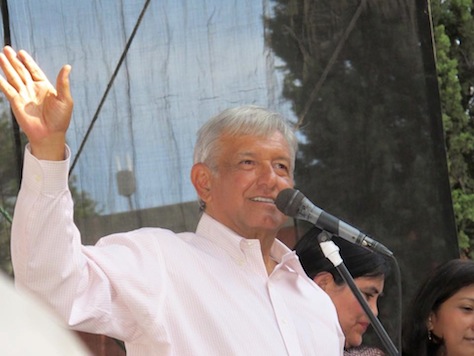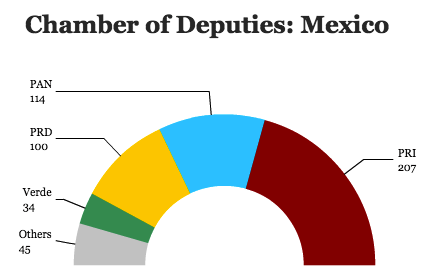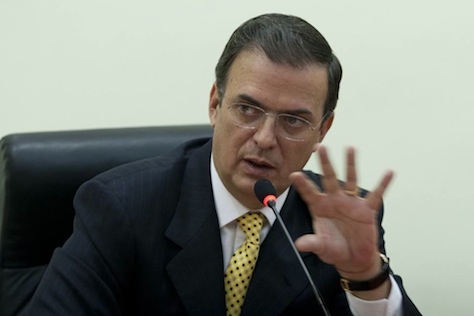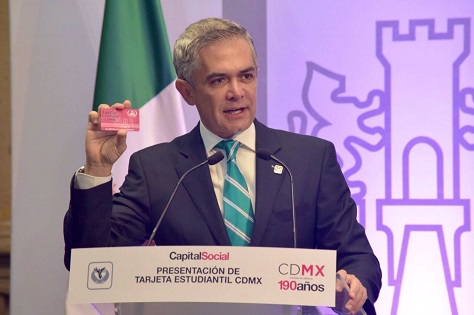With a little patience and a little luck, the 2015 Mexican midterms could have been the magic moment for the long-tormented Mexican left. ![]()
The Partido de la Revolución Democrática (PRD) and one of its founder, Cuauhtémoc Cárdenas, is widely thought to have been fraudulently denied victory in the 1988 presidential election. In the 2006 presidential election, former Mexican City mayor Andrés Manuel López Obrador (or ‘AMLO’) came tantalizing close to winning a race that was presumed his election to lose. In the 2012 presidential election, a race that was supposed to be a runaway landslide for Mexico state governor Enrique Peña Nieto, López Obrador (pictured above) still managed to come within 7% of Peña Nieto.
It’s an understatement to say that Peña Nieto’s presidency has been a disappointment. Mexicans were wary of returning to power the Partido Revolucionario Institucional (PRI), which governed uninterrupted between 1929 and 2000. Those instincts may have been sharp. Peña Nieto has not inspired confidence in his ability to reduce drug violence and the accompanying corruption that surrounds it, his landmark reforms to liberalize the Mexican state energy company haven’t been followed by subsequent tax reforms, Mexico’s economic growth sluggish by historical standards and Peña Nieto, his wife and finance secretary Luis Videgaray have all been tarred by accusations of personal financial impropriety.
Mexican voters, however, seem disinclined to turn back to the conservative party that held the presidency between 2000 and 2012, the Partido Acción Nacional (PAN, National Action Party), which managed to enact even fewer reforms and performed no better on drug violence. In an alternate universe, that would leave space for a challenge from the leftist Partido de la Revolución Democrática (PRD, Party of the Democratic Revolution). Nevertheless, the party and the Mexican left, in general, is so divided that it is in no shape to emerge as a viable alternative.
For starters, the PRD is just as entangled in the mess of violence and corruption as the PRI. Despite the fact that the Peña Nieto administration has received well-deserved grief for its response to last September’s horrifying massacre of 43 unarmed students in Iguala, the PRD governor of Guerrero state, Ángel Aguirre, was forced to resign after his government did little to seek justice, and it was a PRD official who served as the Iguala mayor accused of involvement in, and cover-up of, the students’ murders.
Out of nine states with gubernatorial elections, the PRD is competing in just two of them — Guerrero and Michoacán, both of which have been plagued by corruption and drug violence in recent years. It not only highlights that the PRD’s roots lie in the indigenous-heavy south, but also that the PRD has failed to become a legitimately national party.
* * * * *
RELATED: From Cárdenas to López Obrador —
why the Mexican left just can’t win
RELATED: Two years in, Iguala massacre
threatens Peña Nieto presidency
* * * * *
Most polls show that the PRI, despite the pessimism about the country’s course over the past three years, will win the largest share of the vote in the July 7 elections, possibly even perpetuating the party’s narrow hold, with a handful of allies, on the Cámara de Diputados (Chamber of Deputies), the 500-member lower house of the Mexican congress.
Instead of working together to unite toward the common goal of winning power across Mexico in the 2015 midterm elections and propelling the PRD into contention for the 2018 election, its leaders have engaged in petty infighting and recriminations.López Obrador, who used his gravitas to demand a second attempt at the Mexican presidency in 2012, was the first to abandon the PRD, forming the Movimiento Regeneración Nacional (MORENA, Movement of National Regeneration) shortly before Peña Nieto’s inauguration. Though the PRD has, since the 1990s, held a political lock on Mexico City and the Distrito Federal, it’s now locked with MORENA in a struggle for dominance in the midterm election’s local elections in and around the capital city. By 2018, the civil war on the Mexican left could split the electorate and allow the PRI winning power in Mexico City for the first time since the introduction of an elected mayor and devolved local government.
Marcelo Ebrard, once the most popular of Mexico City’s series of four consecutive PRD mayors, is the leader that AMLO pushed aside in taking the PRD presidential nomination in 2012. Given the problems surrounding López Obrador as a candidate, including the sour-grapes campaign he led in protest of the 2006 election results, there was every reason to believe that Ebrard (pictured above) might have been a more attractive candidate. His attempt to win the national leadership of the PRD late last year failed miserably, when the party instead appointed Carlos Navarrete. Ebrard, a moderate, urged a less confrontational stance to the government’s efforts to introduce private investment to the energy industry, and his record as Mexico City’s mayor suffered with the failure of the poorly designed Line 12, a new metro line unveiled under Ebrard’s watch. After the PRD refused even to add Ebrard to its list of midterm legislative candidates earlier this year, he quit the party too.
Ebrard’s successor in Mexico City, Miguel Ángel Mancera (pictured above), elected in 2012, has cosied up to PRI officials and acts and looks like a silver-haired Peña Nieto clone, despite the fact that he’s already declared his candidacy to be the PRD’s presidential candidate in 2018. His disapproval ratings leapt in late 2013, when he raised the costs of the city’s metro fare from three pesos to five pesos.
López Obrador is widely expected to use MORENA as a platform for a third consecutive run for the presidency. Unless, somehow, Mancera manages to obtain the PRI’s endorsement in 2018 (and there’s no shortage of figures in national and state government ready to take the baton from Peña Nieto), the two candidates will likely just split the vote on the Mexican left — meaning that neither will become president.
As for Cárdenas, the son of one of Mexico’s most beloved presidents, the PRD’s founder, its conscience, the likely winner of the 1988 election and the first elected mayor of Mexico City?
He quit the party too, last November, citing disgust with the party’s growing ties to corruption, especially after the response to the Iguala massacre.



